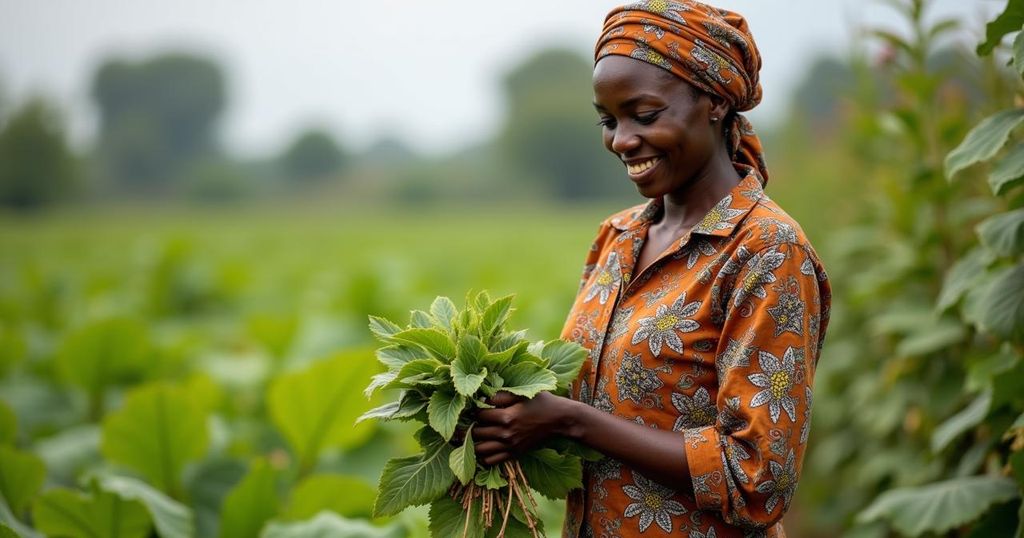Women farmers in Ghana represent 70 percent of the agricultural workforce, utilizing sustainable practices to combat climate change. They advocate for governmental reforms prioritizing agroecology and emphasize the inclusion of women in climate leadership. Environmentalist Awula Serwah discusses the unique challenges faced by women and calls for urgent action and support for women leaders in the climate adaptation efforts.
In the context of the agricultural workforce in Ghana, women represent approximately 70 percent. Predominantly smallholder farmers, these women employ eco-friendly practices that limit the reliance on synthetic inputs, thereby playing a vital role in ecological preservation. Despite facing resource limitations, their use of agroecological methods significantly aids in conserving biodiversity, curbing deforestation, capturing carbon, and mitigating greenhouse gas emissions. Due to their dependence on natural resources for their livelihoods, women farmers across Africa endeavor to protect these vital assets from degradation. Organized as part of a collective social movement, women farmers in Ghana advocate for substantial reforms within the agricultural sector that aim to minimize carbon emissions. They urge the government to take more robust climate action and emphasize the necessity for agroecology to become a cornerstone of the nation’s climate strategy. Awula Serwah, a prominent Ghanaian environmentalist and coordinator of Eco-Conscious Citizens Ghana, elucidates the unique challenges posed by climate change and environmental degradation specifically affecting women and girls. She states, “Climate change and environmental degradation affect everyone. They are not respecter of persons. In communities where women and girls are responsible for food production, fetching water and fetching fuel for cooking, it is especially challenging for them.” Ms. Serwah points out the urgency of change and insists that contributions towards individual responsibilities and avoidance of actions that exacerbate the situation are critical. Further discussing the interplay of gender and climate change, she asserts that leadership in climate adaptation must transcend gender limitations. She notes, “Anyone with a passion, an understanding of climate adaptation and the necessary skills and willingness to lead, should lead. It is crucial that we work towards gender equality but we shouldn’t make climate change a gender issue.” In citing the renowned Kenyan environmentalist, Prof. Wangari Maathai, who founded the Green Belt Movement and was the first African woman to receive the Nobel Peace Prize for her environmental work, Ms. Serwah emphasizes the capability of determined women in environmental leadership. “A determined woman with a lot on her plate can lead on climate adaptation just as well as a man… The key point is not that she was a woman, but that she was deeply passionate about the environment and was driven to make a difference,” she affirms. Ms. Serwah highlights the necessity for government and policymakers to craft effective strategies for the inclusion and support of women in climate initiatives. She believes that women leaders in climate action should encounter no barriers but should rather receive the support required to thrive. “We all have a constitutional duty to protect the environment, and we should demand action,” she asserts.
In Ghana, women make up a significant majority of the agricultural workforce, particularly among smallholder farmers who utilize sustainable practices. The dependence of these women on natural resources makes them pivotal in the fight against climate change, as they advocate for changes within agricultural practices to safeguard their environment. Their collective efforts are fundamental in pushing for governmental reforms pertaining to climate action and the prioritization of agroecology as a means of addressing environmental issues, thus contributing to a more sustainable future. The commentary from Ms. Awula Serwah symbolizes the broader challenges and advocacy efforts women farmers partake in amidst rising global environmental concerns.
The active involvement of women farmers in Ghana exemplifies their crucial role in combating climate change through sustainable agricultural practices. By uniting as a social movement, they advocate for systemic changes that prioritize ecological health and sustainable resource management. The insights from Awula Serwah underscore the necessity of removing barriers to women’s leadership in climate initiatives, emphasized by the urgent need for collaborative and inclusive decision-making processes in environmental policy. Ultimately, recognizing and empowering women as critical stakeholders in the fight against climate change is essential for achieving effective and equitable climate actions.
Original Source: www.un.org






